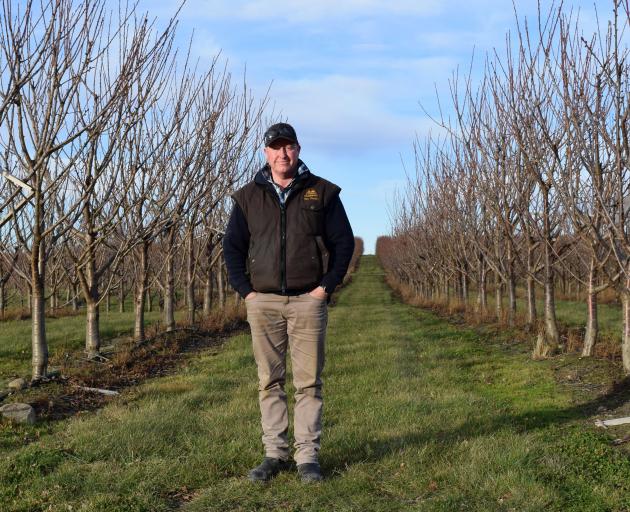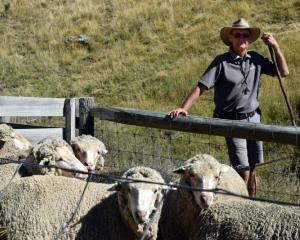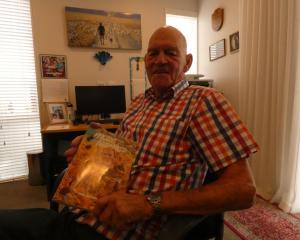
"I know how to grow cherries off that style of tree," orchardist Tim Paulin says.
New cherry growing methods, such as the upright fruiting offshoot system, brings orchard rows closer in a two-dimensional structure and requires a greater investment in posts and wires and more trees than a conventional system.
"We decided to plant more hectarage out in trees rather than put in post and wires."
Mr Paulin has managed other people’s orchards for most of his life.
He had enough of working for other people and wanted some of his own "skin in the game".
"I wanted to take a chance on make or break."
He found some people willing to invest if suitable land could be found to establish a cherry orchard.
As part of rugby training, he ran on a 78ha block of land including steep gullies and covered in gorse, broom and rabbits in Waikerikeri, north of Clyde.
A land deal was secured, the business 3 Kings Cherries was formed and the land was bought in the 2017-18 season.
A trio of rocky schist outcrops on a hill in the district was the inspiration for the company’s name.
The property was rabbit-fenced to stop the pest eating young cherry trees before planting began on the 44ha effective land.
Irrigation was installed and 3 Kings was the first cherry orchard on the Dairy Creek Irrigation Scheme.
The first 4ha of cherry trees was planted in 2019, another 20ha of cherries was planted in 2020 and a further 7ha of cherries was planted in 2021.
Tree planting is ongoing.
The trees produce several cherry varieties, which are harvested between the start of December and the first week of February.

"We are only getting into good production now," Mr Paul said.
The packhouse, including machinery and infrastructure, cost about $5 million.
"It is a lot of money when you say it out loud," he laughed.
Cherries from other growers are also processed in the packhouse.
3 Kings Cherries established a brand to market its fruit to differentiate them from other growers in New Zealand and chase a bigger financial return.
"We have to keep our quality good or we are going to become just another cherry."
The business marketed about 100 tonne last season and hoped to increase this by 50% this season.
Cherry quality would dictate how much of the fruit was marketed on the international or domestic market, he said.
Most of the damaged cherries were sold to Eden Orchards to make pure cherry juice.
A goal was to increase production to export up to 300 tonne of cherries.
The biggest export market for his fruit was mostly Taiwan then China, Singapore and Thailand.
"Taiwan eats more fresh fruit per capita than any other country."
The business aims to supply cherries for the Asian market and, when demand for the fruit spikes, for celebrations such as Chinese New Year.
"That is their big celebration and they’ll buy a lot of cherries at that time and they are happy to buy high-end produce."
Mr Paulin entered the orchard in the 2024 Otago Ballance Farm Environment Awards to showcase its environmental initiatives such as establishing native plants and trialling an organic cherry block.
The process of entering the competition was a good way to learn about your business, he said.

Mr Paulin said he would enter the competition again when there were fewer establishment costs and the balance sheet was stronger.
The business won the People in Primary Sector Award.
Up to 100 people work at 3 Kings Cherries at the peak of the season and the company aims to keep staff happy so they return to work another season.
"If I don’t look after them they won’t come back."
This included providing nice accommodation, within walking distance of Clyde.
Mr Paulin aims to grow a conventional cherry tree which is lower than it could be so staff can pick fruit and prune branches without needing to scale a high ladder.
He is the third generation of his family to grow cherries in Central Otago.
His grandfather Robert Paulin started growing summerfruit, including cherries, on about 4ha in Clyde in 1921 and the Paulin family celebrated a century of harvesting summerfruit in 2021.
Three of Robert’s five sons became fruitgrowers, including Tim’s father Des Paulin.
Tim always wanted to own his own orchard, despite his father telling him he should pursue another career as he could make more money doing something else.
On a wall in Tim’s new office is a framed docket of one of his father’s first payments from Turners & Growers in 1956.
After Tim returned home from studying horticulture at Lincoln University, he managed an orchard in Bannockburn for 18 years, spending winters managing orchards in North America.
He also managed Fortune Fruit in Central Otago for about a decade before launching 3 Kings Cherries.
On returning home from North America, he met nurse Tisha McCaw when he was working for the Clyde Volunteer Fire Brigade and took a patient to Dunstan Hospital.
They pair married and now have four children — Tave, 14, Caja, 12, Niley, 10 and Reef, 7.
He said he was always investigating ways to improve how the orchard operated.
For his second year, he rented robots to scare away bird eating his cherries.
The bird-scaring duties were once carried out by staff driving an ATV and sounding a hooter.
He was the first orchardist to use the bird-scaring technology in Central Otago.
The autonomous robot has four wheels, uses GPS for navigation and features a gas-powered bird scare gun and a loud speaker.
He had programmed the robot to play loud sounds includes the Dalek cry "exterminate, exterminate" from Dr Who.
He was considering buying some of the robots.
"They work 10 hours a day and will work Christmas Day and Boxing Day and they bring themselves back and charge themselves."















